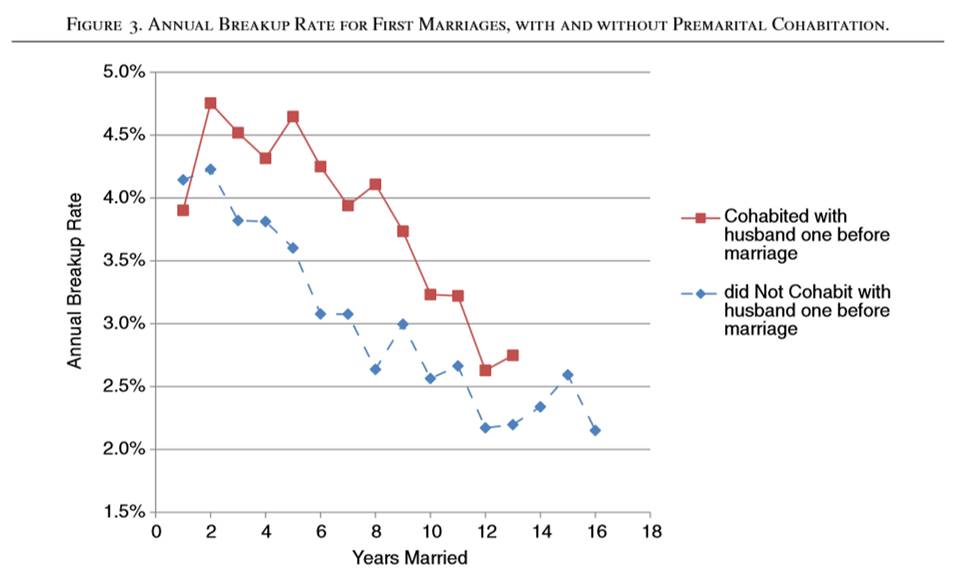It sounds like common sense. Live with somebody for a while and you’ll find out properly if you’re a good match for a life together. Wouldn’t you want to know in advance about that frightful habit you really can’t stand? By living together, you make sure they are the one … and also avoid making a huge mistake!
This is of course quite different to how previous generations thought, brought up to believe that you got married before moving in. But that’s definitely the way many people think today.
And it’s a view that has a growing body of research behind it.
Several studies now suggest that living together before getting married no longer has any effect on your chances of divorce. A 2014 article in Time magazine reports on one prominent study in the Journal of Marriage and Family that found most of the reason why couples do better or worse if they live together first is down to the age at which they move in together, and not whether they cohabit first or marry first.
So imagine the surprise when, four years later, along comes a new study in the same journal that suggests exactly the opposite.
Were previous generations right after all? Apart from the very first year of marriage when the risk is lower, couples who live together first do consistently worse once married compared to those who didn’t live together. Just like the other one, this study takes into account age at marriage, education, ethnicity, length of marriage, the presence of children, and family history.
There’s a healthy – and remarkably polite – debate taking place in academics blogs that argue either why cohabiting prior to marriage continues to raise risks or why it actually lowers them!
Who is right?
There are two widely accepted explanations for why couples who cohabit before marriage tend to do worse.
The first is that selection matters. As the latest study points out, ‘Couples who cohabited before marriage tended to be, even before the cohabitation experience, more liberal, less religious, and more prone to divorce if the relationship turned sour‘.
The second is that experience matters. By starting out in an impermanent and disposable relationship, ‘then as couples advance from cohabitation to marriage, they advance with their relationship commitment already eroded by the casual and informal nature of cohabitation‘.
But there is another explanation that has been overlooked by studies on both sides.
The third is that inertia matters. Quite simply, moving in together makes it harder to leave if things don’t work out. So some proportion of fragile cohabiting relationships will drift into a marriage that might – or even should – never really have taken place. For these couples, marriage happens because it’s the easier option. Instead of ending the relationship early on before cohabiting, the ending is delayed until they are married.
Professor Scott Stanley makes this point in his blog article about the new study.
‘There is no particular reason to expect that the inertia risk will dissipate with increased acceptance of cohabitation because the mechanism is about the timing of the development of aspects of commitment, not about societal views and personal attitudes.’
Crucially, even if this new study is wrong and – somewhat implausibly given the point about inertia – it turns out that married couples do better if they live together first, we mustn’t forget all of the cohabiting couples who don’t even get to marriage. Our own unpublished UK data shows that for every 10 cohabiting couples that marry in any given year, a further 7 cohabiting couples split up.
Whatever these studies tell us about couples who marry, what they don’t tell us is whether living together makes couples more likely to end up in a successful marriage. It doesn’t.
And when couples are asked for the reason why they live together, testing a relationship turns out to be the worst possible reason.
So when it comes to living together, by all means buy before you try. Just don’t be surprised when you discover it’s a lot harder than you think to return the goods if they don’t come up to scratch.

